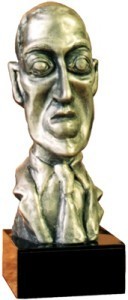Tansy Rayner Roberts's Blog, page 127
November 10, 2011
Galactic Suburbia Episode 46
Howie needs a Hat
In which we celebrate the World Fantasy Awards, take on the Kickstarter phenomenon and why people like to support authors/artists directly, Alex is betrayed by Isobelle Carmody, Alisa still can't finish Tansy's novel, and we indulge in a feedback frenzy.Hurry over to Podbean or iTunes now to get the new episode! Or just sit back, relax and read the show notes.
News
Realms of Fantasy sinks for the third time
Graham Joyce calls BFS Extraordinary General meeting December 9th –
Authors kickstarting their own projects:
Matt Forbeck – 12 novels in 12 months.
Laura Anne Gilman's novella
CE Murphy's novella
(mentions also of self publishing projects of Tracy & Laura Hickman, and Liz Williams)
Catherynne Valente's Omikuji project looking for subscribers in order to keep the project going.
And Tobias Buckell talks about how just because you're self publishing doesn't mean you have to be a …
What Culture Have we Consumed?
Alisa: Power and Majesty by Tansy Rayner Roberts, The Courier's New Bicycle by Kim Westwood
Alex: the Stone Key and The Sending, Isobelle Carmody; I Shall Wear Midnight, Terry Pratchett; end of Life on Mars S2; This is Not a Game, Walter Jon Williams; Distress, Greg Egan
Tansy: Ally Condie, Matched; Lisa Goldstein, The Uncertain Places; Gail Simone, Secret Six: Six Degrees of Devastation; Geek Tragedy, Nev Fountain
Feedback: well overdue!
Please send feedback to us at galacticsuburbia@gmail.com, follow us on Twitter at @galacticsuburbs, check out Galactic Suburbia Podcast on Facebook and don't forget to leave a review on iTunes if you love us!
November 9, 2011
What's in a Name?
16316 / 50000 words. 33% done!
So I think I can blog about my current WIP again because I've started liking it, which after a week of near-torture is something of a relief!
My main problem at the moment is that I am writing a story set in the Verona of Romeo & Juliet (well, not entirely THAT Verona what with the tropical islands and the necromancy) and the only way to add magic and logic and possibly the occasional steam-powered robot (oops) to Shakespeare is to make sure that the canon itself works hard in the story. And there are only three canon facts about my heroine Rosaline, apart from the whole thing about Romeo being in love with her before Juliet: 1) her complexion was pale 2) she was determinedly chaste and 3) her sister's name is Livia.
All of these things have given me a massive headache, at one time or another. But if I chuck them out, why bother calling my heroine Rosaline at all? So I've had to address them in my story, and in the building of the character. The only problem is that now her sister wants to be a point of view character and she's a stitch away from becoming joint protagonist, and I can't, I simply can't have a protagonist called Livia. Quite apart from the fact that I've written three different fictional Livillas in the last two years (OK two of them were historical figures but still) I still live in hope that some day I will write the Great Livia Drusilla novel of all time, and how can I possibly do that if I already have another fictional Livia inside my head?
So I have to screw with canon. Which bugs the hell out of me. Because, you know. I want to be true to the play. Apart from all the liberties I already planned to take.
So she's going to have to be Olivia, or Livian, or Liliane. Or something.
Damn you, canon!
November 8, 2011
Watching New Who: Rise of the Cybermen/Age of Steel
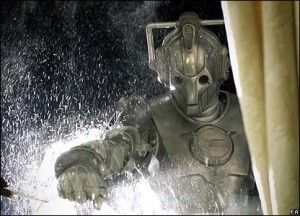 "The Rise of the Cybermen" / "The Age of Steel"
"The Rise of the Cybermen" / "The Age of Steel"
Season two, episodes five and six
The Doctor – David Tennant
Rose Tyler – Billie Piper
Mickey Smith – Noel Clarke
TEHANI:
I thought the early part of the first episode was notable for Ten's high school nastiness to Mickey in the beginning of the episode (and really, throughout). Although perhaps there's some change in his attitude as the two-parter progresses.
David would have been pleased to see the return of Pete!
TANSY:
Yes, I think this is an uneven story in some ways, but it has some great moments in it and the return of Pete (and departure of Mickey) make it worth us paying particular attention, even if it wasn't Hugoworthy. It's in many ways Mickey's story, the one where we see him come into his own, not just as a hero worthy to travel in the TARDIS, but one independent of the Doctor, whose future lies elsewhere. I was sorry to see him go so soon because, as with Jack, it felt like the threesome crew were being given short shrift, but happy to see him find his future.
Pete gets plenty of time too, and it's so cool to see him return, albeit another version of himself. Goes to show that in Doctor Who, there's no such thing as never say never again.
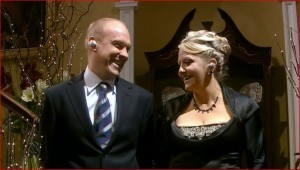 DAVID:
DAVID:
It was great to see Pete back, but his role didn't have the same weight to it as it did in "Father's Day". Of course, that was going to be a hard act to follow! Was it just me who found his farewell to Rose a little odd?
TANSY:
Yes, I think Pete of Season One is definitely a different man, and of course the main difference is that he is actually Rose's father, whereas this one really isn't. I did like that it made it clear that, whereas old Pete was a bit of a loser in the making money department, that's not the only measure of a man – otherworld Pete certainly doesn't seem any happier, for all his wealth and power.
DAVID:
Mickey was brilliant in this episode! I have felt sorry for him on more than one occasion, constantly the third (or even fourth!) wheel and treated pretty nastily by the Doctor. In this episode, though, we get to see a whole other side of him. I thought the part with his grandmother was particularly poignant, and it was great to get more of an insight into his character, rather than him just being the comic relief.
Noel Clarke (and I wish I hadn't looked up the name online as it has ruined a surprise for me!) deserves major props here, he put in a sterling performance and actually made you believe that it was two different people. I loved seeing a harder, tougher version of Mickey and it is interesting who seeing Rickey seems to inspire Mickey to believe he can be something more than the "tin dog".
It has been one of the strengths of New Who, how the writers have given the actors a chance to stretch themselves (Billie Piper playing Cassandra is another example), and to their credit they have really seized their opportunities.
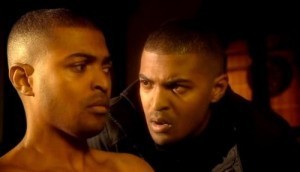 TANSY:
TANSY:
Noel Clarke is a brilliant actor, who has quite a mighty career (as a writer and director as well) away from Doctor Who, and I do think he got much better material in this season. This is my favourite of his stories, and the dual Rickey/Mickey role is so cleverly handled, with drama and comedy all bundled together.
TEHANI
I thought Rickey was great too – love seeing more than one aspect of an actor's ability. Having said that, not at all impressed with the way Jackie is portrayed here, but it's an interesting "sliding doors" extrapolation. Actually, all the women in this are given a pretty short shrift.
TANSY:
Yes, good point. There are some potentially cool female characters – I have a soft spot for Mickey's Gran, and I think Mrs Moore was an unusual and compelling figure in her handful of scenes – but Jackie is supremely awful. I don't think it's completely unfair to suggest, though, that it's quite a realistic potential Jackie who has been taking unlimited wealth for granted for decades, a husband who pays her no attention, and no Rose to connect her to reality.
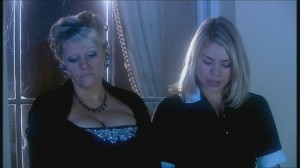 TEHANI:
TEHANI:
Fair call – Jackie can be a bit of a cow in the "real" world, so it's a reasonable projection.
TANSY:
But Other!Jackie's fate is pretty grim, and it's disappointing that she's mostly killed off so we can see how Pete (and Rose) deal with it. But there isn't much sign that Rose is affected by the end of the episode – she's so wrapped up in her Dad.
DAVID:
Jackie is very unpleasant in this! I was actually really shocked by that moment (where she blows up to Rose for having the temerity to forget her place as one of the hired help), it was definitely not what I was expecting. But, I do agree that it is a realistic possibility of how she could have turned out, given different circumstances.
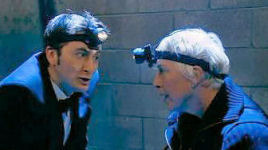 Mrs Moore was one of my favourite characters in this storyline. I loved the whole idea of her being just a normal person who finds herself a freedom fighter, rather than being some gung ho type. It was an interesting departure from the usual stereotype, and the scenes they she did have are some of the ones that stuck with me. It was quite sad to see her die!
Mrs Moore was one of my favourite characters in this storyline. I loved the whole idea of her being just a normal person who finds herself a freedom fighter, rather than being some gung ho type. It was an interesting departure from the usual stereotype, and the scenes they she did have are some of the ones that stuck with me. It was quite sad to see her die!
Mickey's Gran was wonderful, and I found that scene where he knocks on the door deeply moving, especially when we see the torn carpet and it becomes evident he blames himself for her death. Was great writing, great acting and one of those moments where you have to blink a bit!
TEHANI:
The ordinary people in this double were the best part of it I thought. I thought the villains were a bit rubbish. I find the Cybermen boring as villains, to be honest. Sadly, we see a bit of them in episodes to come. What is interesting is the set up for later in the season (and for later seasons) – not sure how much we can/should say in front of David!
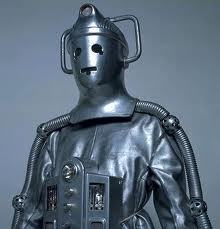 TANSY:
TANSY:
Say nothing about that! I think this isn't a great outing for the Cybermen, but I'm rather fond of them as a concept. There have been some brilliant classic stories! The thing I found it hard to wrap my head around was this reinvention – the original Cybermen were not from Earth, and of course New Who likes to keep things close to home. I think putting them in this alternate Earth is probably the best compromise, but I miss the old Telos/Mondas continuity.
TEHANI:
But wasn't Mondas an alternate Earth? (Did some Googling…  ) So that sort of fits…
) So that sort of fits…
DAVID:
My understanding was that Mondas was the Tenth Planet (hence the title of the first Cyberman adventure, and back when poor old Pluto was a planet!) of the Solar System and virtually identical to Earth. For some reason it broke free of its orbit and ended up drifting through space.
TANSY:
I think I like the clunky stompy new design (there are some gorgeous YouTube vids using music to make them look so impressive) but I agree that the script here is lacking something – the Cybermen should be more chilling and tragic figures than they are. The loss of Jackie is quite a shock but not enough to really make them scary.
TEHANI:
Link please!
TANSY:
I couldn't find the ones I remembered (damn you, YouTube) but these are pretty good:
I do think it's good they chose to tell a story about how the Cybermen began, something never seen in TV Doctor Who before, and there are some clever details about how humans are embracing and interacting with technology on a daily basis, but somehow the script doesn't quite pull together for me. It feels like an over-edited action movie that has missed out too many establishing scenes.
TEHANI:
Which is interesting, because it's a two-parter. I kind of wish they'd pared it back and made it a single (would have preferred "The Girl in the Fireplace" be two!). Might have had a bit more dramatic tension that way.
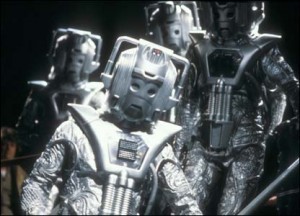 DAVID:
DAVID:
I was a little disappointed with the Cybermen. It's a bit hard to explain, it's not so much how they were used in this episode, there was actually quite a bit to like and I will get to that in a moment,. It's more that I would have liked to have seen such a classic Doctor Who monster used in a more traditional manner at some point. As a species of villain the Cybermen would have to be second only to the Daleks in terms of significance in Doctor Who, and it would have been nice to have a new Cyberman story that used the Telos/Mondas version. So, I guess I was excited at the thought of a Cyberman episode and felt a bit let down that they were not the real thing. Though the Doctor did mention that the Cybermen he had met were from a "world like this one" which I assumed meant Mondas?
But, as I said above, I think there was a lot to like about them. I didn't think that the pod technology was too far fetched (except for people stopping in the middle of the street), we can already see the start of it now with the way technology is becoming an integral part of our life.So, the idea of someone taking the next step into cybernetics made sense in terms of that universe.
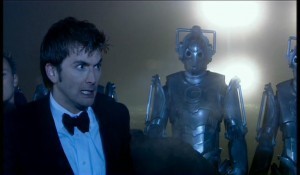 The design was great, I liked the look of the Cybermen themselves, but they way they walked was a bit cartoonish to me. I don't think they were portrayed as formidable as they could have been, they should have been able to rip down a chain link fence or stop a bunch of humans from running past, but they did have an air of menace to them. And the processing machines? Creepy.
The design was great, I liked the look of the Cybermen themselves, but they way they walked was a bit cartoonish to me. I don't think they were portrayed as formidable as they could have been, they should have been able to rip down a chain link fence or stop a bunch of humans from running past, but they did have an air of menace to them. And the processing machines? Creepy.
TEHANI:
The design didn't bother me – I think their motivations were what I didn't buy into.
DAVID:
The scene with the Cyberman that was originally the young bride was touching, and reinforced the point that they were not merely machines, but human beings. I was glad that the Doctor didn't treat their deaths as inconsequential; he has been a bit to cavalier for my taste in other episodes.
TANSY:
Something I think they went out of their way to do in this story was to show that Cybermen didn't have to necessarily be men – and it felt like these moments, with the bride and Jackie – really brought home the shocking alteration in a way that maybe, with male characters, wouldn't have been so strong?
TEHANI:
Because the creatures themselves are very masculine, so it's probably something that needed to be shown.
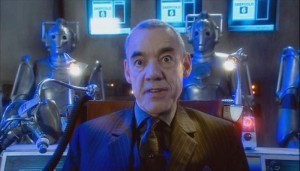 DAVID:
DAVID:
Lumic himself was interesting character. The actor playing him didn't miss any chance to chew on the scenery, but that was kind of fun, and there were more than a few echos of Davros, not just the wheelchair but they way he spoke and the words he used. His offsider was very Michael Caine, wasn't he? The motivations of Lumic were very believable, you can imagine a visionary like that being confronted with his mortality and bending all his gifts towards finding away to live on, and going insane.
TANSY:
I think Lumic is one of the least successful parts of the story – the wheelchair is ridiculously Davros-like, and it would have been nice if they had gone with a less obvious type of villain. I really didn't like many of the choices they made with him. The whole point of the Cybermen is not that they need a powerful evil leader, but that once created, they become self-replicating. I would have liked it if there had been more of a sense of them being created out of altruism and it all going horribly wrong, rather than selfish obsession.
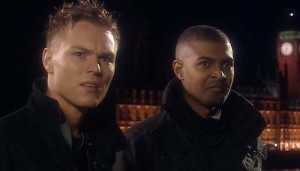 TEHANI:
TEHANI:
Nice to have Mickey save the day. And totally be the better man.
TANSY:
Mickey is an excellent man, and so much better off without Rose. They were no good for each other.
DAVID:
I agree, completely. It was great to see Mickey changing from a passive character who was largely defined by his relationship with Rose, and really just tagging along like a intergalactic third wheel, to one who was strong enough to make his own choices and, in the end, choose his own destiny. Really, the way that Rose and the Doctor treated Mickey a lot of the time did neither much credit.
TEHANI:
The interactions with those fifth wheel characters are really very interesting throughout New Who. Let's go watch some more of them! 
======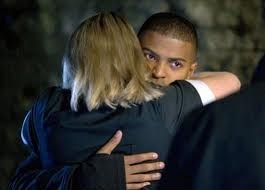 Watching New Who – in conversation with David McDonald, Tansy Rayner Roberts and Tehani Wessely
Watching New Who – in conversation with David McDonald, Tansy Rayner Roberts and Tehani Wessely
David is coming to New Who for the first time, having loved Classic Who as a kid. Tehani is a recent convert, and ploughed through Seasons 1 to 6 (so far) in just a few weeks after becoming addicted thanks to Matt Smith – she's rewatching to keep up with David! Tansy is the expert in the team, with a history in Doctor Who fandom that goes WAY back, and a passion for Doctor Who that inspires us all (plus a six-year-old daughter who is finding her own Doctors for the first time). We're going to work our way through New Who, using season openers and closers, and Hugo shortlisted episodes, as our blogging points. Just for fun! We have already talked about:
"Rose", S01E01
"Dalek", S01E06
"Father's Day, S01E08
"The Empty Child/The Doctor Dances", S01E09/10
"Bad Wolf/The Parting of the Ways", S01E12/13
Season One Report Card – David, Tansy, Tehani
"The Christmas Invasion," 2005 Christmas special
"New Earth", S02E01
"School Reunion," S02E03
"The Girl in the Fireplace", S02E04
November 3, 2011
Friday Links are Fretting About Word Count
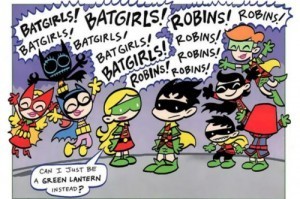 A smaller Friday links than usual because, you know, NANOWRIMO IS EATING MY SOUL.
A smaller Friday links than usual because, you know, NANOWRIMO IS EATING MY SOUL.
Hyperbole and a Half writes (and draws) with hilarawful detail about her adventures with depression.
Kim Westwood talks about her androgynous protagonist in The Courier's New Bicycle and answers my unasked question about how to talk about Salisbury without having an appropriate pronoun to cling to! Also it's a lovely, crunchy insight into her writing.
Sarah Rees Brennan has written a love letter to Teri Hatcher's Lois Lane (hell yeah!) and to the real life woman who inspired her, Nelly Bly.
Malinda Lo interviews Jacqueline Carey – I had no idea she was writing science fiction now! I kind of love the fact that she can do anything she want now in books as far as gender/sexuality goes and it's still tame compared to Kushiel.
A few issues arose at WFC about accessibility, and how cons can or should (or don't) deal with issues of sexual harassment and general creepiness by convention members:
Jaym Gates has assembled information about 'the creeper' at WFC parties, and discusses other similar situations. (is creeper a US term? Pretty sure Aussies just say creep – or possibly use much stronger terms!)
Our Alisa had previously spoken out about her own experience (and that of a group of women) being harassed by this person at the Aussie party.
Mari Ness, meanwhile, posted a point by point post about her horrific experiences as a wheelchair user trying to deal with this convention hotel. I think it should be required reading for all convention committees before selecting hotels for events – and sadly makes it very clear that even if hotels promise you a world of accessibility, that doesn't actually mean they are willing (or able) to deliver what they say they can.
Yes, that's really it. But the award-winning gay SF fandom sitcom that still has not screened in Australia, damn it, now has a trailer! It's better than nothing.
Give us the damn show, ABC.
Apex Magazine #30
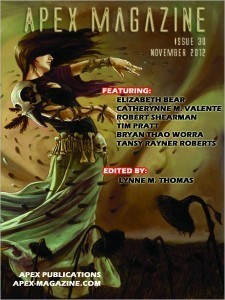 I was sure I had already blogged this, but possibly I just tweeted and podcasted and then fell over. Lynne Thomas (of Chicks Dig Time Lords and the SF Squeecast) has just had her first edited issue of Apex Magazine go live, and it includes an article by me!
I was sure I had already blogged this, but possibly I just tweeted and podcasted and then fell over. Lynne Thomas (of Chicks Dig Time Lords and the SF Squeecast) has just had her first edited issue of Apex Magazine go live, and it includes an article by me!
The article is about why Australian spec fic writers seem to skew so hard towards writing about icky sinister things instead of, you know, sunshine and beer and prawns. I talked to a bunch of writers (Margo Lanagan, Deborah Biancotti, Kaaron Warren, Peter M Ball, Trent Jamieson, Kirstyn McDermott, Jason Nahrung, Cat Sparks, Rob Hood and Richard Harland) who are well known for their dark, weird short fiction, and they came up all sorts of brilliant answers to my sometimes-silly questions.
You can purchase individual copies or subscriptions of Apex here, and the content of the issue is also available (temporarily) for free on their home page.
November 2, 2011
Book Trailer: Nightsiders
I'm so impressed that Terri Sellen has made this book trailer for Sue Isle's Nightsiders – her first attempt at the process! Am now hoping for a Love and Romanpunk one to go with it – must dig out all my Rome pics to see if they are usable.
Day Two: This Nanowrimo thing.
I was just looking back over old posts, and wow I did a LOT of blogging last time I did Nanowrimo, in the grand old days of 2009. Not sure I'll be keeping that up this year. I'm already juggling two different books!
Writing something new is scaryfun, though.
Some Nano links:
Scott Westerfeld linked to a series of posts he and Justince Larbalestier did a few years back, one for each day of Nanowrimo. Some wonderful, clever tips there, with such enticing titles as "Emergency Unstucking Techniques," "Stealing from Chandler" and "Square Brackets".
Ah, square brackets, what would we do without you?
Natalie Zutter at Tor.com looks at some of the Nano books that have actually got published – I commented there, but it got eaten. I had to stop and check what my previous Nano novels were, to see if I'd had any published – and I haven't yet, I will in February! Yes, the first 50,000 words of Reign of Beasts was written in the 2010 Nano! I had completely forgotten that.
Meanwhile, Maureen Johnson is embracing the title of Nanowrimo Agony Aunt. Her blog is always fun to read but gets particularly manic at this time of year. If you have any questions about Nanowrimo, or life and the universe in general, I recommend you head over there and see what Aunty MJ has to say.
November 1, 2011
Those Doctor Who wrap party vids
I know every Doctor Who fan worth their salt has already blogged, tweeted, retweeted, linked to and generally enjoyed at least the first of these vids from the wrap party for David Tennant's (and Russell T Davies' and Julie Gardner's) swan song, but I'm putting them up here for convenience, as Raeli has demanded to watch the Proclaimers one about six times in the last 24 hours.
This one I discovered only this evening, and while the first one has epic awesomeness, you have to admit that a whole lot of work went into this one, and it shows off the talents of John Barrowman, Catherine Tate and David Tennant quite marvellously. Plus, it's funny as hell. I hope somewhere there is video footage of RTD's face when he first saw it.
October 31, 2011
World Fantasy Award for Twelfth Planet Press!
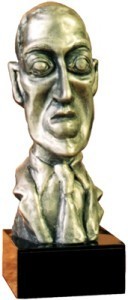 I was working at the university this morning, so only able to sneak the occasional peek at my Twitter feed as the World Fantasy Awards tweets started up, and I almost caused a Serious Disruption to some poor chap's exam when I discovered that our Alisa had picked up her first World Fantasy Award, this time for Special Award Non-Professional. Some day, when she manages to pay herself for all the work she does to publish and promote Australian speculative fiction, I know she'll be up for a matching Professional award too!
I was working at the university this morning, so only able to sneak the occasional peek at my Twitter feed as the World Fantasy Awards tweets started up, and I almost caused a Serious Disruption to some poor chap's exam when I discovered that our Alisa had picked up her first World Fantasy Award, this time for Special Award Non-Professional. Some day, when she manages to pay herself for all the work she does to publish and promote Australian speculative fiction, I know she'll be up for a matching Professional award too!
I'm so very proud to be a Twelfth Planet author.
My, but the trophy is on the dour side. Does anyone want to volunteer to knit a jaunty beret or bonnet or something for hers, to cheer him up a bit?
The whole list of winners can be found here.
Congratulations to all the winners – I am absolutely squeeful about the magnificent Who Fears Death by Nnedi Okorafor winning best novel, but all the winners were worthy, and I hope very much that all the finalists are just as proud of themselves and their achievements. It was a great shortlist this year.
Thanks to Cat Sparks who pointed me in the direction of the following vid. You can see Alisa's award at about the 35 minute mark. It's just a shame that the microphone discriminated against short people! But knowing Alisa, she was probably quite happy to be mostly hidden behind the podium. I hope she had a great celebratory evening afterwards, and a good night's sleep. We'll be interrogating her about her experience on the next episode of Galactic Suburbia!
October 30, 2011
Pratchett's Women III: Werewolf Glamour & the Sexing of Dwarves
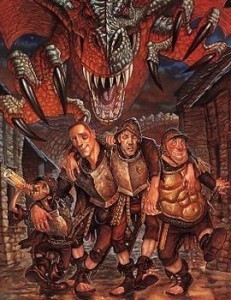 Guards, Guards
Guards, Guards
Men at Arms
Feet of Clay
I always loved the City Watch books of the Discworld series almost as much if not equally to those of the Lancre Witches. Vimes is a wonderful character, someone who has been utterly broken down by life when we first meet him, and gradually pulls himself up by his bootstraps, though he never loses his deep cynicism about the world. The books are packed with lovable, memorable characters: Nobby Nobbs who is basically a big mass of personality quirks mushed together into a smelly vest, cautious Sergeant Colon with a quip for every occasion, and the utterly adorable Carrot, a man so damned GOOD that bluebirds sing whenever he walks down the street. We also get some of the best appearances in the Discworld of the Patrician, one of the most compellingly pragmatic evil overlords ever to exist in fiction, and some of the best stories centred around the city of Ankh-Morpork. All this and some clever, airtight plots, mostly based around police procedural or murder mystery structures. All up, pretty good stuff.
But what about the women?
Guards Guards, the first book featuring the City Watch, is pretty light on when it comes to female characters. The most central woman in the whole story is Sybil Ramkin, dragon expert, whom I love deeply, though it has to be said that she emerges as a fascinating, fully realised and complicated female character despite every attempt of the narrative. Each time she appears, she has to wade through a sea of fat jokes, aristocrat jokes, lonely spinster jokes, and in some cases, all three at once. On more than one occasion she is described vividly as something monstrous or other than human, including scenes from the point of view of the man she will marry in later books.
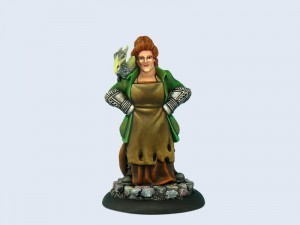 Every time she opens her mouth, though, Sybil proves herself to be awesome. She's not just posh and dragon obsessed and lonely and less than slender, she's also smart, brave, funny, generous, and a good person. I don't know how to feel about the final scene in which Vimes capitulates to her romantic expectations – it's gorgeously written, and terribly clever, but I did rankle at him only belatedly admitting that he finds her attractive, and the fact that she is pretty much described as a perfumed siege engine rather than a person. But I love her, I love him, and I do find their later relationship one of the best things about these books (gosh I hope it still is, better brace myself for the visit of the suck fairy) so I will forgive Pratchett for giving Sybil such a problematic debut.
Every time she opens her mouth, though, Sybil proves herself to be awesome. She's not just posh and dragon obsessed and lonely and less than slender, she's also smart, brave, funny, generous, and a good person. I don't know how to feel about the final scene in which Vimes capitulates to her romantic expectations – it's gorgeously written, and terribly clever, but I did rankle at him only belatedly admitting that he finds her attractive, and the fact that she is pretty much described as a perfumed siege engine rather than a person. But I love her, I love him, and I do find their later relationship one of the best things about these books (gosh I hope it still is, better brace myself for the visit of the suck fairy) so I will forgive Pratchett for giving Sybil such a problematic debut.
The rest of the women in Guards Guards are largely invisible. We are told about Carrot's mother, his old girlfriend Minty, his new sort-of-girlfriend Reet, and his innocent friendship with the local brothel madam Mrs Palm and her "many unmarried daughters," all through scenes in which they don't actually appear, through dialogue or in his letters home. Likewise Mrs Colon is referenced but we don't meet her. The entire plot, about a man who uses another bunch of men to summon a dragon and overthrow the Patrician in favour of a fake king to rule them all, and the men who stop him, is one big cockforest. But to put it into context, this is a very early Discworld book, one which had (mostly) not yet accepted that women could play roles other than sexy love interests, funny-because-not-sexy love interests, landladies and witches.
As I discussed in the original Pratchett's Women post, later Discworld books are far more inclusive of female characters, and that holds true for the City Watch volumes.
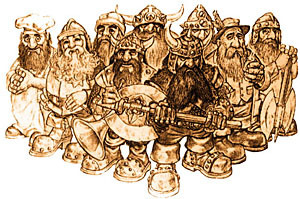 The most interesting gender-related aspect of Guards Guards is the matter of dwarf sex. In the early days of the Discworld, we get several throwaway jokes about the issue of dwarves, and why people only ever see the 'males' of the species (ie the gruff little men with large beards and pick-axes). Here, as I think in several other early books, we discover that the female dwarves are all over the place, but are physically indistinguishable from male dwarves when clothed. While this is basically one extended bearded woman joke, Pratchett is to be credited in that he a) noted how often in fantasy we do indeed see whole magical species which appear to be 100% male and b) eventually took that joke about the tact required in dwarfish romances much further, exploring gender presentation, femininity and cultural norms surrounding sex.
The most interesting gender-related aspect of Guards Guards is the matter of dwarf sex. In the early days of the Discworld, we get several throwaway jokes about the issue of dwarves, and why people only ever see the 'males' of the species (ie the gruff little men with large beards and pick-axes). Here, as I think in several other early books, we discover that the female dwarves are all over the place, but are physically indistinguishable from male dwarves when clothed. While this is basically one extended bearded woman joke, Pratchett is to be credited in that he a) noted how often in fantasy we do indeed see whole magical species which appear to be 100% male and b) eventually took that joke about the tact required in dwarfish romances much further, exploring gender presentation, femininity and cultural norms surrounding sex.
Sadly none of that is in this book. Here it is notable only in that Carrot's relationship with Minty is deemed inappropriate (because he's human, though adopted by dwarves, and more than twice her size) and that the whole matter is dealt with in an incredibly patriarchal way – while their mothers are referenced, it's dealt with by the fathers. Pratchett has not yet worked out how a truly blind-to-gender society might function, and is falling back on default settings.
Speaking of defaults, the matter of dwarf sex is mirrored in a final revelation about the mighty dragon tormenting the city, which is that she's a girl. In light of the other gender issues of this book, I did find the handling of that revelation problematic, not least because we get several fat jokes about the dragon INSTANTLY upon discovering her gender. Gender also should not actually make any difference to the fact that this is a monster we have seen not only wantonly destroying people and property (as is her nature) but psychologically tormenting several other people. As soon as we learn that the dragon is female and that Errol the tiny swamp dragon isn't fighting her so much as courting her, we're supposed to go awwww and laugh about the variation in their sizes (as is mirrored with jokes about Carrot/Minty and Vimes/Sybil) and everything's okay. Sure, it's nice for Errol and all that he escaped which his mass murdering girlfriend, but I remain troubled by that particular statement about gender.
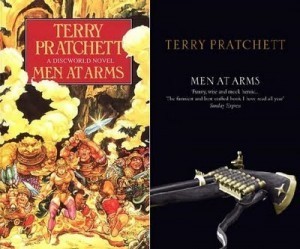 Men at Arms, the second City Watch book, is notable for the introduction of Angua the werewolf. Which is good, because Sybil's role has been diminished, and there's still no interesting exploration of dwarf sex going on.
Men at Arms, the second City Watch book, is notable for the introduction of Angua the werewolf. Which is good, because Sybil's role has been diminished, and there's still no interesting exploration of dwarf sex going on.
The premise of Men at Arms (quite apart from the plot, which is all about assassins, clowns, gentlemen and the Patrician, most of whom are male characters) is that the Ankh Morpork City Watch are undergoing two major administrative changes: Vimes is stepping down to marry Sybil and become a Gentleman of Leisure, and the Patrician has brought in new reforms which demand a greater representation of diversity among the guards. Thus the new guards are A Troll, A Dwarf, and A Woman. Though of course Angua being female is a red herring – while Carrot and those readers not paying close attention would assume this is why she is there, she was actually hired because she is a werewolf, and thus a representative of the Undead.
Though it is certainly played for laughs, this inclusion of nonhumans in the City Watch is to become a vital aspect of their identity in future books, and some of the ramifications are explored substantially, through the growing tolerance/friendship of Lance-Constable Detritus (troll) and Lance-Constable Cuddy (dwarf) but particularly with the friendship and romance of Angua and Carrot. On my recent reread, with this essay topic in mind (and because she is generally the first person most readers cite as an Awesome Discworld Woman), I found myself scrutinising the portrayal of Angua. She's handled quite unevenly in Men at Arms which was a surprise to me as coherent characterisation is one of Pratchett's great strengths, and I remembered this as being her book. But it felt at times like he hadn't decided what she was there for – there is far too much reference to how knock out gorgeous she is, and the descriptions of her fall of loose blond hair were quite irritating for the same reason I get annoyed by the presentation of Olivia Dunham on Fringe. The character is practical – she'd tie her damn hair back. Likewise the number of times we are encouraged to think about Angua naked – sure that's a side effect of being a werewolf, but I was put off by the snigger-snigger tone of these scenes.
 Angua's point of view doesn't enter the book until quite late in the narrative – at first she's just part of the crowd, and it bugged me how she alternated from being the one who was sharper than everyone else (getting the dirty joke no one else does, for instance) to being the one who needed to have something quite simple explained. Her personality shifts for narrative convenience But once her point of view finally arrives, and we learn about how she functions as a werewolf and her bemused thoughts about how Carrot behaves, her character comes beautifully to life. She's smart and snarky, and her vulnerability about being a werewolf is countered by her resentment and sense of injustice. She really is a fantastic character, I was just surprised how long it took for us to get there.
Angua's point of view doesn't enter the book until quite late in the narrative – at first she's just part of the crowd, and it bugged me how she alternated from being the one who was sharper than everyone else (getting the dirty joke no one else does, for instance) to being the one who needed to have something quite simple explained. Her personality shifts for narrative convenience But once her point of view finally arrives, and we learn about how she functions as a werewolf and her bemused thoughts about how Carrot behaves, her character comes beautifully to life. She's smart and snarky, and her vulnerability about being a werewolf is countered by her resentment and sense of injustice. She really is a fantastic character, I was just surprised how long it took for us to get there.
Another problem I had with the narrative was Carrot's blatant anti-undead sentiment. He as a character has been so untroubled by any other form of bigotry up until now, even those ingrained in him from being raised a dwarf. It seemed odd that he was weirded out by Mrs Cake and her lot, but didn't bat an eyelid about trolls being people too. So Angua wasn't the only one whose character didn't always make sense!
Their romance is handled quite effectively, and I liked that it was very much about the meeting of two equals who see the world entirely differently, and don't fit together perfectly. The sex scene, which like all other Pratchett sex scenes is handled with so much discretion that you could almost blink and miss it, is cleverly conveyed and says a lot about both of them as people. Despite my reservations about parts of this storyline, I love the bit where Carrot has to suck up and deal with his prejudices – not just about the undead, but about women. In the end, getting his head around Angua's strength and invulnerability is probably a bigger deal than her spending a few days a month as a canine.
Angua doesn't have to learn anything because she's already pretty great, but that does rather relegate her to supporting character rather than protagonist, and from the point that she decides to sleep with Carrot, we don't get to see inside her head any more, as the story goes back to being about his reactions. It's far more of a practical romance than a soppy one, and doesn't provide any perfect happy ever after kind of solutions. Worth noting that Angua's friendship with Gaspode the Wonder Dog brings out far more of her natural personality than her romance does…
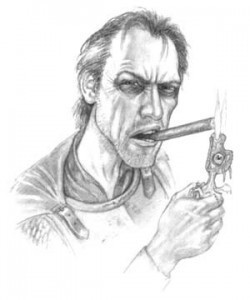 It's disappointing to me that Sybil took such a back seat in this novel, in which gender is at least an important sub-plot, especially considering that her wedding to Vimes is part of the climax of the story. Without dragons being important, it is only her roles as his future wife and aristocrat that are relevant here, and considering how traditional she is in this regard, she is pretty much background to Vimes' crisis about how to fit into her world. We don't see them talk about, for instance, the fact that she has signed over her entire fortune to him (he finds this out from her bank manager), or that he has quit drinking to make her happy. I think it's a shame that it's Carrot, and not Sybil, who comes up with the idea of making Vimes a Knight and putting him back in charge of the expanded Watch. Mostly she worries about him, from afar.
It's disappointing to me that Sybil took such a back seat in this novel, in which gender is at least an important sub-plot, especially considering that her wedding to Vimes is part of the climax of the story. Without dragons being important, it is only her roles as his future wife and aristocrat that are relevant here, and considering how traditional she is in this regard, she is pretty much background to Vimes' crisis about how to fit into her world. We don't see them talk about, for instance, the fact that she has signed over her entire fortune to him (he finds this out from her bank manager), or that he has quit drinking to make her happy. I think it's a shame that it's Carrot, and not Sybil, who comes up with the idea of making Vimes a Knight and putting him back in charge of the expanded Watch. Mostly she worries about him, from afar.
By the time Feet of Clay comes along, the third City Watch book, Sybil has disappeared entirely. Like Mrs Colon, she is an invisible wife, referred to when relevant, and staying entirely out of the plot. The only consolation for this is the development not only of a far crunchier and more interesting relationship between Carrot and Angua than suggested in Men at Arms, but also the long-awaited matter of DWARF SEX and the introduction of one of my favourite female friendships of the Discworld series.
Feet of Clay is a really excellent book – certainly better in plot and emotional depth than the two previous City Watch books. It has a really wonderful police procedural plot concerning a not-quite-assassination attempt on Lord Vetinari, and the community of golems in Ankh Morpork, and along with all the twists and turns of the mystery itself, the narrative also contains a meta-commentary on police work in general. Everything Guards Guards and Men at Arms did well, Feet of Clay builds upon, almost perfectly.
The unsatisfactory and at times uneven portrayal of Angua in Men at Arms is made far more noticeable by her much more substantial portrayal here – we learn who she is and what kind of life she comes from, but only in small, telling details which don't detract from the main plot. Her central concern at the beginning of the novel is pretty much the same as it is by the end – she is certain that her relationship with Carrot has no future, and that she has to leave him soon, before it becomes too hard. But she can't. It's never clear whether the reason she can't is because she loves him (as a woman), or because she is loyal to him (as a dog), and it is not resolved.
Which would have been immensely frustrating, if that was the only thing she did or thought about in the novel. But it's not, because along comes Cheery Littlebottom, whose friendship with Angua lights up the pages in amongst the golem angst and clever Vimes-related plottery.
We are introduced to Cheery as a male dwarf. Even the pronoun 'he' is used, which is not a cheat, because we have learned in previous books that all dwarves say 'he' as their default. But Cheery, as Angua with her werewolf nose spots instantly, is female. (it's not clear why Angua decides to make a thing of this for this dwarf in particular when there are other female dwarves in the Watch, nor why Cheery is terrified people might know, but I don't care because it kickstarts my favourite ever sub-plot)
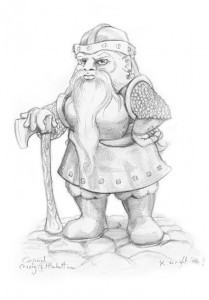 Cheery is an alchemist, hired by Vimes to be his forensics expert, even though he is pretty much making the job up as he goes along – and indeed, so is Cheery. She is deeply unhappy when we first meet her, largely because of her own perceived failures as a dwarf. She doesn't fit in with the traditional dwarfish culture, and feels alienated from them because she feels drawn to traditionally feminine pastimes. Female dwarves are equal to male dwarves in every possible way – but only because they look, act and appear exactly like male dwarves. Which, of course, is not quality. Angua draws a parallel to being a woman in the City Watch – you are allowed to be one of the boys, but only if you act just like them (or, rather, just enough like them to be part of the group, but not so much like them that they get intimidated).
Cheery is an alchemist, hired by Vimes to be his forensics expert, even though he is pretty much making the job up as he goes along – and indeed, so is Cheery. She is deeply unhappy when we first meet her, largely because of her own perceived failures as a dwarf. She doesn't fit in with the traditional dwarfish culture, and feels alienated from them because she feels drawn to traditionally feminine pastimes. Female dwarves are equal to male dwarves in every possible way – but only because they look, act and appear exactly like male dwarves. Which, of course, is not quality. Angua draws a parallel to being a woman in the City Watch – you are allowed to be one of the boys, but only if you act just like them (or, rather, just enough like them to be part of the group, but not so much like them that they get intimidated).
With Angua's help and assistance, Cheery begins the process of coming out as a female dwarf. She experiments with gender presentation, and while this is largely played for laughs as the bemused male characters like Carrot and Vimes react to her jewellery, makeup and/or the wearing of a skirt, there's quite a serious theme behind the humour. Cheery, or Cherie, or Cherry, as she sometimes chooses to be called, is certainly deadly serious. There's a quite wonderful scene in which she faces off against a group of her fellow dwarves for the first time, bravely dealing with their disgust and disapproval, only for one to hang back afterwards and beg to try her lipstick. Because, of course, she's not the only female dwarf in the Watch, and by leading the way, she is able to give other dwarves the opportunity to present as female, if they want to.
She never contemplates shaving off her beard, of course. Because… it's her beard. And she wants to present as female on her own terms, not mimicking what human women do.
There's also a running theme about the strength of women – another favourite scene of mine has some angry, violent criminals in a tavern grab Angua as a hostage. The tavern is full of her fellow Guards, who calmly watch, knowing just how well she can take care of herself. Even Carrot, who loves her, merely reminds her quietly not to kill anyone. It's rather lovely that Carrot has learned to overcome his natural chivalry because of who Angua is – and this is mirrored later by his concern for Cheery in the field, where he would not have been so protective of a dwarf who presented as male.
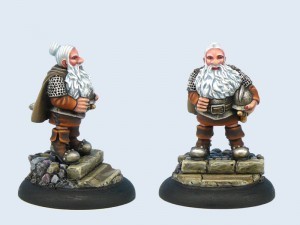 Cheery's aversion to the undead, and Angua keeping the secret from her despite knowing it is inevitable she will one day find out, makes sense in so many ways (in stark contrast to Carrot's prejudice in Men at Arms) and I liked that there was plenty of time devoted to the ramifications of this deceit, even in the middle of the more epic plot. The way that this female friendship had to overcome serious obstacles was given the kind of priority in the story that is usually devoted to a romance, which makes a pleasant change.
Cheery's aversion to the undead, and Angua keeping the secret from her despite knowing it is inevitable she will one day find out, makes sense in so many ways (in stark contrast to Carrot's prejudice in Men at Arms) and I liked that there was plenty of time devoted to the ramifications of this deceit, even in the middle of the more epic plot. The way that this female friendship had to overcome serious obstacles was given the kind of priority in the story that is usually devoted to a romance, which makes a pleasant change.
Also, I love that the first forensic scientist of the Discworld is a woman – and in amongst the issues to do with her coming out story and gender performance/presentation, we see her high level of competence at her job. Vimes learns to rely on her for her alchemical skills and her ability to be flexible, coming up with new tests and techniques to match his crazy and inventive ideas for what policework should involve. The running gag about Cheery/Cherie wearing earrings, or a skirt, or so on, could have detracted from this, but it never does. Vimes takes it in his stride, and you get the impression that he would have done as much if it was Sergeant Colon or Nobby who turned up to work in a frock.
Well, I'm pretty sure nothing about Nobby could surprise him.
So far, then the City Watch books have three interesting, complex and thoroughly different female characters across the first three books. Not bad really for a series that is primarily about the agency of male characters – about the push-pull of Vimes' relationship with the city and the Patrician who rules it, about Carrot the uncrowned king, who is genuinely interested in everyone and wants to help them, but doesn't seem aware of the power of his own charisma, of Nobby and Colon, Shakespearian clowns if ever there were any, and many more.
These are not books about women. But the women in them have so much potential and so much to say. I am heading now into less familiar territory, with several City Watch books I never read more than once (I loathed both Jingo and The Fifth Elephant, and don't remember a word of Thud) but I am hoping very much to find a book which gives me Sybil, Angua and Cheery all at once. Possibly it doesn't exist, but we'll see!
=====
Previous posts in this series:
Pratchett's Women: The Boobs, The Bad and the Broomsticks
Pratchett's Women II – Slash! Stab! A Lesson in Practical Queening in Lords and Ladies

